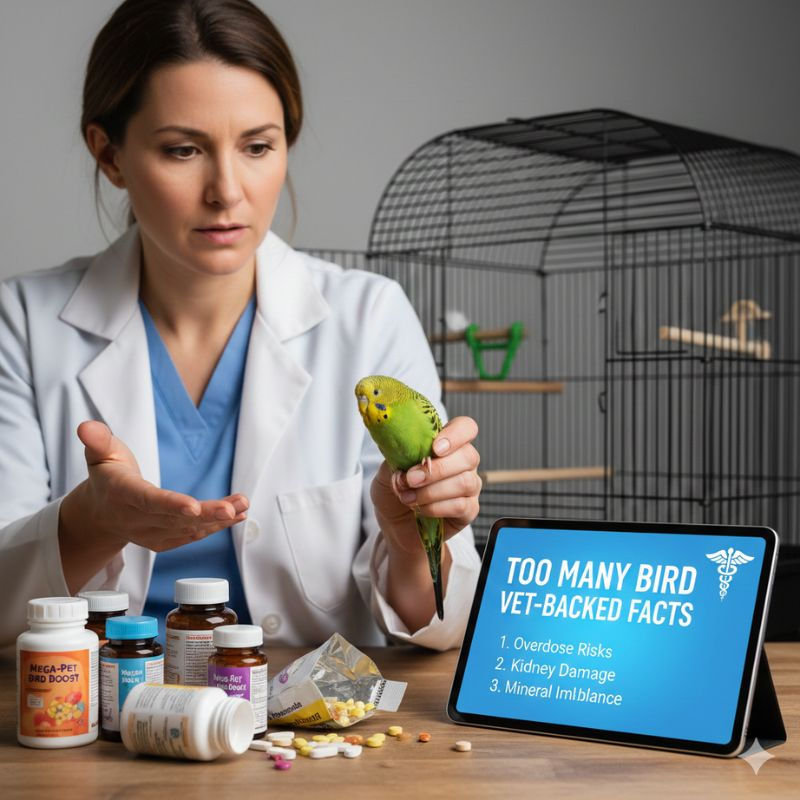Can Too Many Bird Vitamins Be Harmful? Risks of Over-Supplementation
- petperchlove
- Feb 28, 2025
- 3 min read

Introduction
Bird owners often strive to provide the best care for their feathered friends, ensuring they receive proper nutrition and essential supplements. While bird vitamins play a crucial role in maintaining a bird’s overall health, excessive supplementation can lead to serious health complications. Understanding the risks of over-supplementation and how to balance nutrients properly is essential for every responsible bird owner.
The Importance of Bird Vitamins
Birds require a variety of vitamins to support their immune system, feather health, and overall well-being. Some of the most essential vitamins include:
Vitamin A – Supports vision, skin, and respiratory health.
Vitamin D3 – Essential for calcium absorption and strong bones.
Vitamin E – Helps in reproduction and muscle function.
Vitamin K – Aids in blood clotting.
B Vitamins – Important for metabolism and nervous system function.
Many bird owners turn to best bird vitamins available in the market to ensure their pets receive adequate nutrition. However, not all birds need supplements, especially if they already consume a well-balanced diet.
Risks of Over-Supplementing Bird Vitamins
While vitamin supplements can be beneficial, excessive intake can lead to toxicity and health problems. Here are some of the common risks associated with over-supplementation:
1. Hypervitaminosis A (Vitamin A Toxicity)
Excessive Vitamin A can lead to toxicity, causing symptoms such as swollen eyes, respiratory issues, and kidney damage. Birds that already receive sufficient vitamin A from their diet should not be given high doses of supplements unnecessarily.
2. Vitamin D3 Overdose and Calcium Imbalance
Too much Vitamin D3 can lead to calcium buildup in the bloodstream, resulting in kidney damage and calcification of soft tissues. Birds exposed to adequate sunlight or UV lighting typically do not need additional Vitamin D3 supplements.
3. Excess Vitamin E and Blood Disorders
Although Vitamin E is crucial for muscle and reproductive health, excessive amounts can lead to blood clotting disorders. It may cause internal bleeding or hemorrhaging in birds.
4. Vitamin K and Clotting Issues
While Vitamin K is essential for proper blood clotting, excessive doses may disrupt the natural balance, potentially leading to abnormal bleeding or clot formation.
5. B Vitamin Overdose and Neurological Effects
High doses of certain B vitamins, particularly B6, can cause neurological symptoms, such as loss of coordination and nerve damage.
How to Properly Supplement Bird Vitamins
To prevent over-supplementation, follow these best practices:
1. Consult an Avian Veterinarian
Before adding any bird vitamins to your pet’s diet, consult with an avian vet to determine if supplementation is necessary.
2. Provide a Nutritionally Balanced Diet
A well-rounded diet consisting of pellets, fresh fruits, vegetables, and seeds often provides all the essential vitamins a bird needs.
3. Use the Best Bird Vitamins Wisely
If supplementation is required, opt for best bird vitamins from reputable brands that offer balanced formulations specifically designed for your bird’s species.
4. Follow Recommended Dosages
Always adhere to the manufacturer’s dosage instructions to prevent overuse. Avoid adding extra doses unless prescribed by a vet.
5. Observe for Signs of Over-Supplementation
Watch for symptoms like lethargy, abnormal feather condition, digestive issues, or behavioral changes, which may indicate vitamin overdose.
Final Thoughts
While bird vitamins are essential for maintaining avian health, excessive supplementation can do more harm than good. Responsible bird owners should focus on providing a balanced diet, using best bird vitamins only when necessary, and following expert recommendations. Always consult an avian vet before introducing new supplements to your bird’s routine to ensure optimal health and longevity.
Frequently Asked Questions (FAQs)
1. How do I know if my bird needs vitamin supplements?
A veterinarian can assess your bird’s diet and overall health to determine if supplementation is needed. If your bird eats a well-balanced commercial pellet diet, additional supplements may not be necessary.
2. Can I give human vitamins to my bird?
No, human vitamins are not formulated for birds and may contain harmful levels of certain nutrients. Always use best bird vitamins designed for avian health.
3. What are the best sources of natural vitamins for birds?
Fruits, vegetables, leafy greens, and high-quality pellets provide natural sources of essential vitamins. Carrots, sweet potatoes, and dark leafy greens are great for Vitamin A, while nuts and seeds contain Vitamin E.
4. How often should I give my bird vitamin supplements?
The frequency depends on the bird’s diet, age, species, and health condition. Follow your vet’s guidance to avoid unnecessary supplementation.
5. What should I do if I suspect my bird has vitamin toxicity?
If you notice any unusual symptoms, stop supplementation immediately and seek veterinary care. Early intervention can prevent severe health complications.



Comments